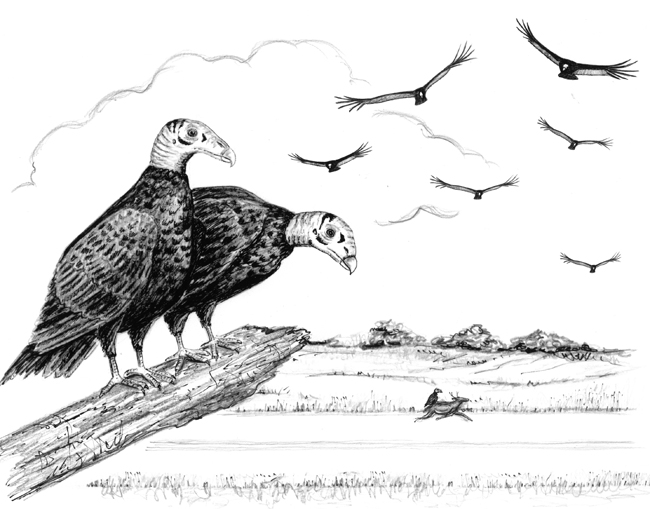
Dear Bird Folks,
I’m wondering about birds’ senses. Do they have the sense of taste, smell, sight, hearing and feeling?
– Josophine, Chatham, MA
Of course, Josophine,
Even though bird senses are very complicated, I think you probably know the answer to some of this already. Birds have excellent hearing. Vocalizations are how they communicate (except for perhaps Mute Swans, which have to rely on text messaging to get their thoughts across). If you think about it, there would be no point for songbirds to sing if other birds couldn’t hear them. As for sight…really? Flying is tough enough, but it would be a major challenge if the birds couldn’t see where they were going. (I know the birds that hit our windows sometimes seem like they lack proper vision, but they are just having a bad day.) And yes, birds have the ability to feel, so keep that in mind. When people say things like, “I hate those darn Blue Jays” or “Turkeys sure are stupid,” the birds hear that and it hurts their feelings. Wait! Maybe you are talking about a different type of feelings. Fine, they have those, too.
Understanding birds’ ability to smell and taste has baffled researchers for years. The problem is, there are nearly 10,000 different bird species in the world. That makes it hard to perform tests on one bird species and then apply it to all the others. What works for chickadees might not be relevant to penguins. It’s also hard to test birds because they can’t talk, at least not in any helpful way. We can’t invite a couple of crows into a room, secretly open a bag of fresh Cinnabons cinnamon rolls and ask if they can smell the sticky goodness. (Although I sure hope they can; just think how sad it would be for any creature that couldn’t smell Cinnabons.)
To find out if birds can smell, scientists investigated the problem internally. They examined the olfactory centers in the brains of a number of birds. What they discovered was that some birds did indeed have bigger olfactory bulbs than other birds (which has to be a source of embarrassment for the small-bulb birds). Surprisingly, the birds that seemed to score high on the smell sensitivity chart are vultures. You would think that if any bird didn’t want to smell what it was eating, it would be a vulture. Most other birds of prey look for movement to help spot their quarry, but vulture food doesn’t move…ever. Instead, the vultures locate their meals by focusing on the smell of death. Seeing vultures circling high in the sky is a good indication that something delicious and dead is down below.
Seabirds also appear to have the remarkable ability to sniff out their food. I’m not sure if you know any whalers, Jo, but early whalers regularly reported birds appearing out of nowhere anytime they were performing the barbaric task of chopping up a whale. Since whale hunting occurred long before things were posted on Facebook, the birds smelling the carnage is the only plausible explanation. Other seabirds seem to smell their way home. When returning to their nesting burrows, Leach’s Storm Petrels typically arrive upwind, causing researchers to believe the birds can smell their very own burrows. To test this theory scientists “inactivated” the birds’ olfactory nerve, which resulted in the birds having trouble finding their nests. I personally haven’t been in contact with any Leach’s Storm Petrels, so I hate to judge them, but if these birds can smell their homes from a long distance away, they may want to invest in a little Febreze.
Taste is another sense that doesn’t appear to be strong in birds, and that surprises me. Oh sure, maybe they don’t need to detect the subtle flavors in their meals. After all, most food is quickly gulped down whole. But wouldn’t taste allow them to choose appropriate food from bad? Yet based on their equipment, it would seem hard for birds to taste anything. By comparison, we humans have nearly 10,000 taste buds, plus our mouths are warm, soft and moist (that’s as far as I’m going before the NBC censors shut us down). But birds only have a few hundred taste buds. In addition their beaks are typically rigid, having the texture of a toenail, and their hard tongues have the warmth of a strip of vinyl. Yet, depending on the species, studies have shown birds can be sensitive to sweet, sour, bitter and salt. For example, hummingbirds appear to be able to discern levels of sweetness and insect-eating birds will reject bitter-tasting insects. (Insects have likely evolved the foul taste for self-preservation. Bugs know what they are doing.)
It’s clear that the vast majority of bird species have exceptional hearing and vision. The answer to their smelling and tasting skills isn’t as cut and dry. Some bird species have an excellent sense of smell, while others either don’t have it or haven’t developed a need to use it. And their sense of taste is likely just sensitive enough to help them find or avoid certain foods.
When comes to senses, Josophine, birds by and large have better hearing and vision than humans do. But we are able to taste and smell better than most birds can. But like I said earlier, there are exceptions, so it’s hard to make a blanket statement about all 10,000 species. Even though humans have a superior ability to taste food, birds have better taste in fashion. I mean you will never see a bird out in public wearing, say, a fanny back. It’s too bad we can’t say the same thing about humans.